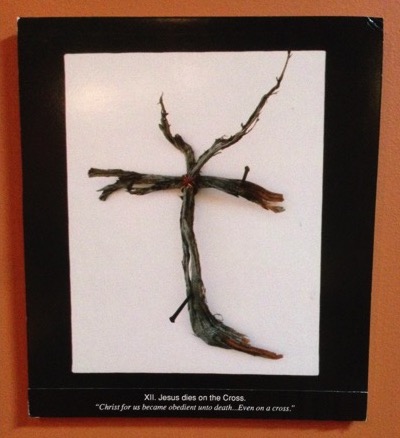by Maria Evans
Readings for Good Friday
A good friend of mine changed the way I feel about the Passion Gospel forever, particularly John’s version, the one we’ve come to expect to hear if we attend a Good Friday service.
The man, now of blessed memory, but for over two decades he was my mentor, colleague, and trusted friend…and he was also very, very Jewish. Thanks to him, I probably have a way more comprehensive Yiddish vocabulary than any country girl from northeast Missouri ought to have. Yet, what he brought to my Christian theology was the sense of hearing fingernails on a chalkboard every time I hear “the Jews” when the Gospel is read.
My friend had more than a passing relationship with my home church–in his retirement, he often liked to attend with me as he loved good food, and good conversation. He was happy to “put up with church” for the prospect of hearing good music, watching the liturgy as a performance, and spending quality coffee hour time with people who loved him and considered him “family” despite the clear religious difference. He had lived much of his life married to a Christian, so he was a great sport when it came to Christianity. We used to joke about his “membership” in “Trinity Beth Shalom.” He loved Episcopalians because he thought we were smart and engaging and maybe even a little intellectual…and he was definitely an intellectual himself.
In short, even as a regular visitor from another religious tradition, he brought things to our little community that were worth cherishing. It did, on occasion, though, make for occasionally uncomfortable car rides when church was over, depending on where we were in the liturgical year.
“You know, Evans, I love your people, but Christianity is still very anti-Semitic.”
I would stammer and valiantly try to defend the faith. “Aw, come on, Jesus was Jewish. Y’all are like our ancestor tribe.”
“Yes, you are. But the Christian Bible is still full of “the Jews, the Jews.” And when you say “the Jews” in your New Testament, it doesn’t sound any different than when the mamzers in white sheets and pointy hats say it. And for that matter, you’ve stolen our liturgy in lots of places. You say part of the shema sometimes. You often read from Torah. Your priest uses the Aaronic blessing sometimes. That’s our script, and you all act sometimes like you invented it I love your church friends to death, don’t get me wrong. But sometimes that stuff just smarts, and I am sure you don’t mean to be anti-Semitic, but it IS anti-Semitic.”
I still cringe that I never had much of an answer for him. “I get what you’re saying, , but I don’t have a good answer for you about the Gospels. They are translations from the Aramaic and Greek. People put a fair amount of stock in being true to the original meaning. You know I’m not a literalist, but I guess I’m not sure how to solve that one. I only know not to call Jewish folks “Jews” myself in conversation. I am not sure how to fix the Bible.”
Years later, I still don’t know how to solve that one. I’ve heard it said that substituting “Judeans” might work…but is that just swapping one J-word for another? One could say “The Jewish authorities” or “some Jewish authorities,” I suppose. I play around with other forms…”The Levitic priests.” “The leaders of the synagogue.” I am never quite sure what is the best thing to do. It’s hard not to sacrifice historicity if we go too generic in our description–yet, on the other hand, that historicity clearly includes racism. We in the Episcopal Church have acknowledged our complicity in other forms of racism in our history. Is this one that all of Christianity needs to acknowledge?
I am grateful to God that I had a friend like this man, who changed the way I heard words that I took for granted. Yet it still doesn’t address the larger issue. Where do we go from here? I invite your thoughts and respectful comments.
Maria Evans, a surgical pathologist from Kirksville, MO, is a grateful member of Trinity Episcopal Church and a transitional Deacon in the Episcopal Diocese of Missouri. You can also share her journey on her blog, Chapologist.
Image: Stations of the Cross XII by Ann Fontaine

